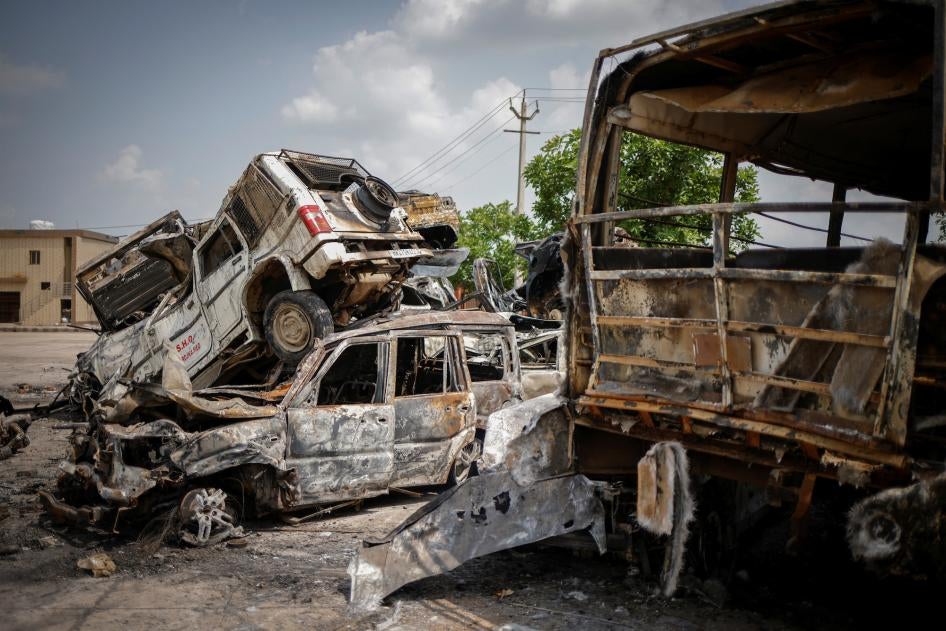Biased Justice System Undermines Rule of Law
Meenakshi Ganguly
Deputy Asia Director
HRW
mg2411

Click to expand Image
Burnt vehicles are pictured following clashes between Hindus and Muslims in Nuh district of the northern state of Haryana, India, August 1, 2023. © 2023 Adan Abidi/Reuters
Bands of angry Hindu and Muslim young men in the streets, violent attacks, looting, arson. This is a chilling vision of the breakdown in rule of law in India.
This is what happened in Haryana state when Hindu groups planned a parade. The violence that broke out on July 31 was apparently triggered after a member of a group affiliated to the ruling Bharatiya Janata Party (BJP), who is accused of murdering two Muslim men, issued a video encouraging people to join the parade. Muslims, believing that he was part of the gathering, targeted the procession. Hindu groups retaliated.
In the violence that ensued, six people were killed, including two members of the security forces. Schools and colleges were closed in several areas, and the state authorities suspended mobile internet services in three districts until August 5.
Incidents like this are the unfortunate and obvious outcome of the BJP government’s Hindu majoritarian politics, including the adoption of laws and policies that systematically discriminate against minorities and stigmatize critics of the government. The continued vilification of Muslims has resulted in an increase in hate crimes.
“We hope and trust that the state authorities, including police agencies, will ensure there is no hate speech against any community, no damage is caused to any property, and wherever required adequate police or paramilitary forces will be deployed,” the Supreme Court said after hearing petitions over planned protests by BJP affiliated groups – Vishwa Hindu Parishad and Bajrang Dal – in response to the violence in Haryana.
Perceived bias has severely dented faith in the rule of law and is exacerbating an already fraught situation. Authorities are quick to punish Muslims who protest while absolving members of Hindu mobs that chant slogans and attack Muslims, their businesses or places of worship. Bail for government supporters is rarely opposed, but government critics are viewed as a threat and remain incarcerated. Evidence in the trials of pro-government Hindu perpetrators has a tendency to be insufficient, leading to acquittals. Even if they are convicted, BJP affiliates can be pardoned or paroled.
Prime Minister Narendra Modi has been promoting Indian democracy abroad, but at home it is a different story. His claims cannot be considered credible while he continues to implement discriminatory policies.
Click to expand Image
Burnt vehicles are pictured following clashes between Hindus and Muslims in Nuh district of the northern state of Haryana, India, August 1, 2023. © 2023 Adan Abidi/Reuters
Bands of angry Hindu and Muslim young men in the streets, violent attacks, looting, arson. This is a chilling vision of the breakdown in rule of law in India.
This is what happened in Haryana state when Hindu groups planned a parade. The violence that broke out on July 31 was apparently triggered after a member of a group affiliated to the ruling Bharatiya Janata Party (BJP), who is accused of murdering two Muslim men, issued a video encouraging people to join the parade. Muslims, believing that he was part of the gathering, targeted the procession. Hindu groups retaliated.
In the violence that ensued, six people were killed, including two members of the security forces. Schools and colleges were closed in several areas, and the state authorities suspended mobile internet services in three districts until August 5.
Incidents like this are the unfortunate and obvious outcome of the BJP government’s Hindu majoritarian politics, including the adoption of laws and policies that systematically discriminate against minorities and stigmatize critics of the government. The continued vilification of Muslims has resulted in an increase in hate crimes.
“We hope and trust that the state authorities, including police agencies, will ensure there is no hate speech against any community, no damage is caused to any property, and wherever required adequate police or paramilitary forces will be deployed,” the Supreme Court said after hearing petitions over planned protests by BJP affiliated groups – Vishwa Hindu Parishad and Bajrang Dal – in response to the violence in Haryana.
Perceived bias has severely dented faith in the rule of law and is exacerbating an already fraught situation. Authorities are quick to punish Muslims who protest while absolving members of Hindu mobs that chant slogans and attack Muslims, their businesses or places of worship. Bail for government supporters is rarely opposed, but government critics are viewed as a threat and remain incarcerated. Evidence in the trials of pro-government Hindu perpetrators has a tendency to be insufficient, leading to acquittals. Even if they are convicted, BJP affiliates can be pardoned or paroled.
Prime Minister Narendra Modi has been promoting Indian democracy abroad, but at home it is a different story. His claims cannot be considered credible while he continues to implement discriminatory policies.
SEE
No comments:
Post a Comment